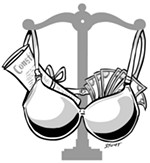Does Harry Potter Cause Sexual Violence? Only in Texas.
Defending a new nudity tax, the AG says topless bars cause sexual violence
By Richard Whittaker, Fri., Dec. 28, 2007
On Dec. 17, the state comptroller successfully fought off a request for a temporary injunction against the new "titty tax" – a $5-per-customer surcharge on sexually oriented businesses. District 53 Judge Scott Jenkins rejected the request from the Texas Entertainment Association and Karpod Inc., management firm of Players bar in Amarillo, because the association could not prove immediate irreparable harm before Jan. 1, when the surcharge actually takes effect. In the three-hour hearing, however, lawyers for the comptroller introduced a radical new defense they may use when they face a request for a permanent injunction in the new year.
Throughout the passage of House Bill 1751 and the subsequent debate about the surcharge it created, the author, Rep. Ellen Cohen, D-Houston, and her staff have insisted the bill is not an attempt to connect sexually oriented businesses with sexual violence. Instead, they argue it creates "an apples to apples comparison": a business that mainly employs women putting cash into a sexual-abuse program fund that would benefit victims of crimes that primarily affect women.
That was then. At Tuesday's hearing, the comptroller's attorney produced University of Texas at Austin associate journalism professor Robert Jensen and trial attorney Kevin Madison as "expert witnesses" to justify the surcharge, supporting the state's new claim that there is a connection between sexually oriented businesses and sexual violence against women. Jensen, who writes about the effects of pornography on gender relations, said there is a "clear link between pornography and sexual violence." Calling porn a "training manual" for sexual activity and abuse, he said the findings of his research could be applied to all "sexually exploitative industries" – including adult cabaret. Madison, who has represented victims of sexual assault, was restricted by Trevin to solely discussing his experience as a police officer in Bastrop County, 25 years previously, working around strip clubs. (Unsurprisingly, there was no testimony concerning male performers or employees, nor performances for an all-female audience, although these contexts would also be covered by the law as written.)
Assistant Attorney General Jim Todd argued that it doesn't matter what Cohen, author of the bill, had intended. Instead, this testimony concerned a previously unstated secondary effect, which legislators might have considered when deciding to vote for the bill. There need be no legislative record of such possible connection, he argued, nor any proof to support the state's presumption that it exists.
The plaintiffs' lawyers responded that the surcharge is inherently unconstitutional. "Adult entertainment" is indeed covered by the First Amendment, but it is a less protected form of speech than "political" speech, meaning it can be regulated. Those regulations must be narrowly defined restrictions on time, place, or manner – for example, restrictive zoning. An industrywide surcharge violates that precedent, the plaintiffs argued, and must be defined as either a "fee" or a "tax." Also, under Texas law, a fee on a particular industry must be directed to regulation of that industry, not to some other purpose; otherwise, the proposed surcharge would be an occupational tax, making it an unconstitutional tax on protected speech.
The plaintiffs' lawyers also challenged the bill as overly broad. Throughout the hearing, the state referred to the 151 (or 168, depending on the speaker) topless and nude bars in Texas, traditionally called sexually oriented businesses, as the law's only targets. When Texas Entertainment Association lawyers argued the tax could be levied on other venues, Todd responded, "You can't invalidate a law because someone can imagine a way that it can be abused."
But as written, HB 1751 extends the definition of sexually oriented business to any venue that allows drinking and exhibits full or partial nudity, or simply exhibits performers in clothes insufficiently opaque around the breasts, buttocks, or genitals. In drafting the comptroller's enforcement rules (not yet issued), Bryant Lomax, tax policy division manager, confirmed he is using a very broad interpretation and will take "the plain meaning of the words in the statute and [try] to apply them as reasonably as possible."
Strictly speaking, that would mean that wet T-shirt contests, burlesques, and theatrical performances, or even fashion shows of transparent, translucent, or thinly woven clothes, could be liable for the surcharge. The comptroller's draft rules supposedly sorting all this out are to be published in the Texas Register on Jan. 4, followed by 30 days of public comment. So for more than a month after the surcharge takes effect, many businesses will have no way of knowing whether they are liable and should be collecting the surcharge.
At the hearing, the state argued that sexually oriented businesses (as traditionally defined) are causally linked to sexual violence, but the comptroller's rules are expected to use the new, expanded definition of sexually oriented business. So if the stage play Equus – starring Harry Potter star Daniel Radcliffe in a fully nude scene and opening on Broadway next year – tours in Texas, under the draft rules, any theatre that hosts the play might well have to collect the surcharge. The logic – in the eyes of the attorney general – would seem to be that the nudity in Equus is contributing to sexual violence.
Much more at risk, of course, would be smaller theatrical productions that happen to employ nudity – everything from experimental contemporary work to comic burlesques – and most of which could not sustain the financial burden.
Defenders of the surcharge, including Cohen, have said that by challenging the surcharge, the Texas Entertainment Association is blocking funding for essential and universally supported needs. The association's lawyers agreed that funding the state's sexual-abuse programs is a good cause. However, if that case had been made at the Capitol and the Legislature had duly funded the programs with general revenues, the cash would have been available in September, along with the rest of the state budget. Even if the surcharge survives the court challenges, collection will not begin until April of next year.
Got something to say on the subject? Send a letter to the editor.









